March 8th, 2023

Children are born with a set of primary teeth – 20 to be exact – that help them learn to chew and speak, and develop enough space in the jaw for the permanent teeth that will appear several years later. Kids are especially susceptible to decay, which can cause pain and tooth loss – a problem that could interfere with oral development. As a parent, it is important that you take proactive steps to keep your child’s teeth as healthy as possible.
Bottles and “Sippie Cups”
One of the biggest culprits of childhood tooth decay is poor diet. This begins as early as a few months old, when children are often allowed to go to bed with bottles and “sippie cups” of milk or juice. The sugars in these beverages – even natural sugars – can steadily decay the teeth.
Drs. Rose Ralph and Hayley McClendon and our staff suggest serving children milk and juice only at meal times, and limiting juice intake to just a few ounces per day. If your child becomes thirsty between meals or likes to go to bed with a bottle, serve water during these times.
Hygiene
As a parent, you can establish healthy dental habits long before your child’s first tooth erupts. Start by gently wiping your baby’s gums with a clean wash cloth during the first months of life. By age one, graduate to an appropriately sized toothbrush with fluoridated toothpaste, and brush at least twice a day.
Dental Visits
Dental visits should start young and continue on a regular basis throughout your child's life. Drs. Rose Ralph and Hayley McClendon and our staff recommend parents bring their children to Hollywood Dental Center for the first time no later than the child’s first birthday. Initial visits concentrate on parental education, while later visits may include thorough cleanings and fluoride treatments as your child grows.
For more information about keeping your child’s teeth cavity-free, contact our Lufkin office to schedule a dental consultation and checkup.
March 1st, 2023

Ideally, it should never hurt when you floss your teeth. But if you haven’t flossed in a long while or don’t do it regularly, you may experience sore or bleeding gums. You should floss every day to avoid pain and maintain the best oral hygiene. In the meantime, there are a few things you can do to make flossing a little more pleasant.
Be Gentle
If your gums are sensitive, take your time and be gentle while flossing. Rough flossing can lead to more irritation and soreness. Also, daily flossing should help your gums become acclimated to the practice, and as a result, irritation should decrease over time.
Use an Alternative Method
If you still feel discomfort after being gentle, an alternative method of flossing may work better for you. A water floss machine or Waterpik can dislodge food particles and plaque without irritating your gums. Also, some brands of floss have a soft coating that make them less harsh and harmful to your gums.
Many people tend to forget or skip flossing, but it is one of the most important steps your dental hygiene routine and shouldn’t be neglected. If you are consistent about flossing, your gums should become used to it and won’t be so irritated in time.
For more flossing tips, schedule an appointment at our Lufkin office and ask Drs. Rose Ralph and Hayley McClendon or a member of our team!
March 1st, 2023

Our team at Hollywood Dental Center recently learned that in the decade between 2000 and 2010, the amount of adults who regularly visited their dentist declined, according to research released by the American Dental Association's Health Policy Resources Center (HPRC). In fact, the HPRC found that the percentage of adults who had regular checkups every six months declined from 41 percent in 2003 to 37 percent in 2010. The largest decline in dental care occurred in the 35- to 49-year-old age group. That’s down from 43 percent in 2003 to just 38 percent in 2010.
There is some good news, however. While adult visits may have decreased, children's visits were on the rise, particularly among low-income families. More low-income children are visiting the dentist now than they were ten years ago. And the HPRC notes that between 2000 and 2010, dental visits among low-income children increased in 47 states.
Have you ever wondered why the American Dental Association and Drs. Rose Ralph and Hayley McClendon recommend that you come in for a dental checkup and cleaning every six months? While daily oral hygiene habits are essential to good oral health, professional dental cleanings at Hollywood Dental Center ensure your and your child’s teeth are treated to a deeper level of cleaning. In addition to a thorough cleaning and teeth polishing, regular visits at our Lufkin office help us detect and prevent the onset of tooth decay and periodontal (gum) disease. During your visit, we’ll check the health of your mouth, teeth, gums, cheeks, and tongue for symptoms of any oral disease. We will also check old fillings and restorations, as these can wear away over time from constant chewing, clenching, or grinding at night.
If you are predisposed to oral diseases due to age, pregnancy, tobacco use, or medical conditions such as diabetes or dry mouth, Drs. Rose Ralph and Hayley McClendon may recommend you visit our office more often than every six months.
If you are overdue for your next checkup and cleaning, please give us a call to schedule an appointment!
February 22nd, 2023

Xerostomia, commonly known as dry mouth, is a condition in which the salivary glands in the mouth don’t produce enough saliva. Saliva keeps the mouth moist and cleanses it of bacteria. A lack of it makes for an uncomfortably dry mouth that is also more susceptible to infection and disease.
Symptoms of dry mouth include:
- Dryness or a sticky feeling
- Frequent thirst
- Burning sensations or redness in the throat or on the tongue
- A sore throat or hoarseness
- Difficulty chewing, swallowing, or tasting food
Dry mouth usually comes about as a side effect of certain medications or medical conditions, but can also be caused by damage to the salivary glands because of injury or surgery.
If you're experiencing any of the symptoms of dry mouth, here are a few tips for what to do:
Double-check medications: If you are taking any prescription or over-the-counter medications, speak with Drs. Rose Ralph and Hayley McClendon to see if any of these could be causing the dry mouth as a side effect.
There may be ways to alleviate the symptoms.
- Stay hydrated: Whether you have dry mouth or not, it’s essential to stay hydrated. Drink plenty of fresh and pure water throughout the day. A good rule of thumb is to drink eight eight-ounce glasses of water a day.
- Suck or chew on a natural, sugar-free candy or gum: Sucking on candy or chewing gum will keep your salivary glands producing saliva. Healthier versions of sugar-free candy and gum are available these days. Some are made with xylitol, a sugar alcohol that actually helps prevent tooth decay.
- Add moisture to your living spaces: Try adding a vaporizer to your bedroom or the rooms where you spend the most time. It’s best for your home to have a humidity level of between 40 to 50%. Anything less than 30% is too low. You can measure humidity with a hygrometer, which is easy to find at your local department store or online.
These are just a few general tips, but if you’re experiencing the symptoms of dry mouth often and it’s interfering with your life, pay a visit to our Lufkin office. That way you’re more likely to get to the root of the problem.






 Website Powered by Sesame 24-7™
Website Powered by Sesame 24-7™